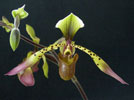|
|
|
|
 |
Email Address Recovery or Password Reset |
Use our Change Password page, and you can set a new password, or if you don't remember which email address you
registered with, the same page may be able to suggest it based on another you enter.
|
|
|
|
|
| |
Flasks of
Paphiopedilum lowii 'MC2320' × self |
|
| |
|
|
| |
|
|
Click to Enlarge

Pod Parent Flower |
|
|
|
| |
Culture Notes from Donor: Parent plant: Temperature range W (70-90°F). These plants grow in warm temperatures with high humidity and slightly shaded conditions.
Comments: Parent plant: This plant is the offspring of Paphiopedilum lowii 'Low's Dream' HCC/AOS x 'Purple Flame'.
Plants are large, leafspan approximately twenty inches. Tall inflorescence (twenty inches) with four to seven flowers. Flowers are approximately six inches across. Flowering season is spring to early summer.
For additional origin/habitat information supplied courtesy of
Charles and Margaret Baker, see further below, near the bottom of this page.
|
Temperatures we attempt to use in the lab & greenhouse:
| For Species: |
|
Spring, Summer, Autumn, Winter: days average 79°F, nights 62°F; best fit is Intermediate 83-60°F
(Source:
Baker's Web OSC) |
|
About the name...
| Etymology of |
lowii |
|
Named for Mr. Hugh Low (father of Sir Hugh Low) of the orchid nursery Messrs. Low & Son of Clapton, England.
(Sources:
Braem & Bakers, Mayr & Schmucker 1998) |
| Etymology of |
Paphiopedilum |
|
From Greek "Paphia" the name of Aphrodite of Cypress; "pedilon", sandal.
(Source:
Pridgeon 1992) |
| Pronunciation of |
lowii |
|
LOW-ee-eye
(Source:
Hawkes 1978) |
| Pronunciation of |
Paphiopedilum |
|
paf-ee-oh-PED-i-lum
(Source:
Pridgeon 1992) |
|
If you would like to direct someone to this web page, please copy and paste this URL into your email:
http://troymeyers.com/d?014007
| Flask Information |
| Availability: |
We have sold all of the flasks for this item. |
| You should: |
Consider getting individual plants or compots instead of a flask.
You can place a "Notify Flask Recipients" Request, and either we or a flask recipient may contact you when plants are available.
You may also place a "Notify Retries" Request, and if an identical pollination (the same parents) is done again, we'll let you know.
You may reserve a flask, but it's very unlikely you'll get one ...this could only happen if we found a flask that we didn't know we had. |
| Yield Estimate: |
390 plants (based on flask surveys done 07/21/2004 through 01/26/2005)
|
| Plantlet Sizes: |
From many flasks 25 - 65 mm plants (based on flask surveys done 02/25/2005 through 07/07/2005)
From one most recently surveyed flask 25 - 40 mm (07/07/2005)
|
|
You might also want to:
|
View the seed assay for this item.
View items of the same species.
View items of the same genus.
|
| Ordering Information |
| You are not currently logged in. |
|
You must be a registered user and be logged in to reserve a flask or place a notification request. Please log in:
|
|
 |
Email Address Recovery or Password Reset |
Use our Change Password page, and you can set a new password, or if you don't remember which email address you
registered with, the same page may be able to suggest it based on another you enter.
|
|
|
|
|
|
|
|
| |
The origin/habitat information below is supplied courtesy of Charles and Margaret Baker
The following information is based on the name of the plant provided by the donor, and assumes that the name is correct. If the plant has been misidentified, then the following information may not be correct.
This text is copyrighted by the Bakers and may not be reproduced without permission.
ORIGIN/HABITAT: Sumatra, Malay Peninsula, Borneo, Java, and Celebes. At
first glance, Paphiopedilum lowii appears to be epiphytic, lithophytic,
and terrestrial, but it is a humus epiphyte. It grows with its roots
penetrating thick moss on trees, in pockets of leaf litter, or on boulders
or cliff faces with roots buried in moss or humus filled pockets. Plants
grow near water or in areas with heavy rainfall and are usually found in
bright locations, frequently in full sun for part of the day. They are
normally found at 2500-4500 ft. (760-1370 m) but have been reported from
as low as 800 ft. (250 m) and as high as 5250 ft. (1600 m).
More about this information and the Bakers...
|
|
|
| |
|
|
|